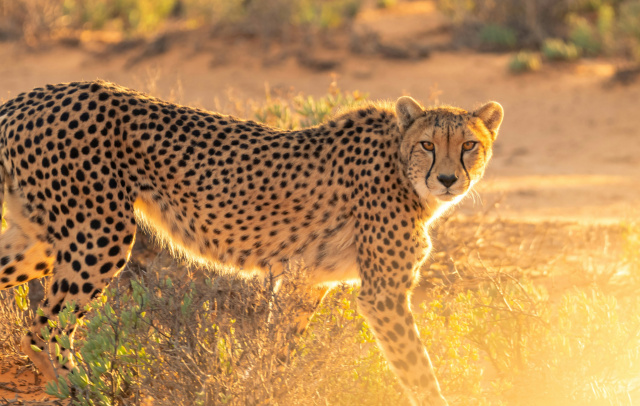Cheetah
The cheetah is the world’s fastest land animal, built for speed, stealth, and precision on the African plains.
This large African cat best known for being the fastest land animal in the world, capable of incredible bursts of speed to catch its prey. With its slender body, long legs, and distinctive black tear marks, the cheetah is built for agility and precision. It lives mainly in open savannas and grasslands across sub-Saharan Africa, where it hunts during the day and relies on stealth and acceleration rather than strength.

Cheetah
Acinonyx jubatus
Felidae
The cheetah has a slim, lightweight body, long legs and a deep chest. Its eyes have two large stripes running down under its chin. Its long tail helps with its balance.
The black line running from the corners of their eyes around their mussel and their thin body and spots.
The cheetah is the world’s fastest land animal, capable of reaching speeds up to 100 km/h (62 mph) in short bursts. But though they can run as fast as a car on a highway, they do not have the stamina to keep it up for very long.
Grasslands, shrublands open woodlands and savannahs.
Zebras, wilder beast and other large mammals.
Cheetahs can breed all year round, they have a short gestation period that lasts for around 95 days, and then they give birth to 1-5 kittens.
Eastern and Western Africa, sub-Saharan Africa. There is also a very small population of Asiatic cheetahs found in Iran.
Vulnerable
The main threats to cheetahs are habitat loss, human confliction and illegal poaching.
According to the IUCN/SSC Cat Specialist Group less than 7000 adult cheeahs are left in sub-Saharan Africa. Some estimates find that this is more than a 50% decline in the past 40 years. In Asia, the cheetah has disappeared from almost all of its entire historic range. Currently, fewer than 50 individuals are thought to be left, found only in Iran. These are Critically Endangered.
Barks, yowls and roars.
A cheetah can be spotted in several National Parks and Nature Reserves in sub-Saharan countries such as Kenya, Tanzania, Namibia and South Africa. However, cheetah's are solitary and elusive, and can be tricky to spot on the savannah.
You might like...

It started in South Africa

Growing up surrounded by science

Maasai Mara

Selous Game Reserve
Newsletter
Sign up to keep in touch with articles, updates, events or news from Kuno, your platform for nature
